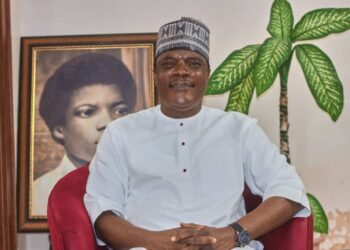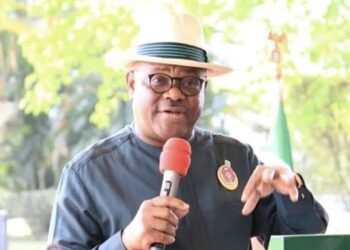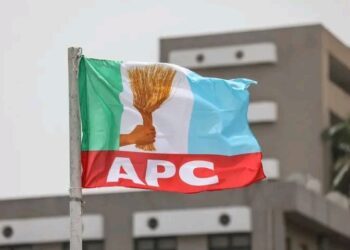By Samuel Igbetua, Lokoja
Kogi state, in North Central Nigeria under the immediate past governor Alhaji Yahaya Bello arguably was neither the bride nor did she profit from the goodwill of many Nigerians on account of largely unpalatable reports.
The incessant unpalatable reports of violence, killings, kidnappings and of late, corruption did not assuage the situation.
The reports of these vices arguably diminished and indeed paled to the insignificant the socio-economic and political developments in the state.
All indices points to the fact that Kogi state is crisis ridden coupled with allegations of ill payment to civil servants and pensioners.
Yahaya Bello remain the epicentre of the diagnostic. He is vilified and derided by many.
Arguably , no decent society would sweep away the alleged level of infractions or insecurity in the state if proven .
The narrative in Kogi is interesting, intriguing and conversely so.
Curiously, no one has given credit to Yahaha Bello for initiating and indeed implementing free education policy from primary school to post primary schools in the state nor was he recognized for establishing two new universities in the confluence state in addition to the State university in Ayingba where he built and equipped a Teaching Hospital.
Prior to Bello’s administration, the state of education in Kogi lacked clear direction. For instance, a comprehensive survey conducted in 2017 by the ACTIONAID/PIBCID revealed critical insights into the education sector’s performance and challenges in the state.
These findings highlighted deficiencies in performance and instructional delivery that hindered the achievement of critical goals: improving literacy rates, advancing Early Child Care Development Education (ECCDE), enhancing the quality of education from basic to tertiary levels, promoting girl-child education, and elevating Information and Communication Technology (ICT) skills and STEM education.
In response to these challenges, Bello directed the Ministry of Education, Science, and Technology to organised the 2018 State Education Summit, known as the ‘Education Roadmap.’
This summit gathered stakeholders to devise strategies for the state’s educational development.
Subsequently, the State Education Law of 2020 was enacted to provide guidance and regulation for the operation of the education sector.
The Ministry of Education, Science, and Technology, went a step further by developing the State Education Strategic Plan (SESP) 2021-2030 and the State Education Operational Plan (SESOP) 2021-2027, which align with the Ministerial Strategic Plan (MSP) to address gaps in the education sector.
Under the leadership of Bello, the administration transformed the education landscape from one marked by neglect and decay to one filled with hope, improved access, equity, infrastructure development, and enhanced service delivery.
One of the administration’s groundbreaking achievements in the education sector was the allocation of 30% of the budget to education in each fiscal year since 2021. This allocation exceeded the UNESCO-recommended benchmark of 26%, underscoring Bello’s unparalleled commitment to education in the state.
To ensure effective utilization of this investment, the state government under Bello conducted training sessions for over 2,000 school managers, focusing on curriculum delivery, quality assurance, and enhanced efficiency in partnership with National Teachers Institute (NTI), National Population Commission (NPC), Nigerian Educational Research and Development Council (NERDC), and the Federal Ministry of Education (FME).
Additional training sessions on conducting the Annual School Census have been provided to over 1,500 individuals by the Ministry of Education, Science, and Technology.
To enhance the workforce in the education sector, the government under Bello recruited an additional 3,979 teachers in February 2023 from a pool of 22,342 applicants.
Before 2015, Kogi State’s education landscape was a cause for worry.The performance of Kogi students in external examinations like the West African Examinations Council (WAEC), National Examinations Council (NECO), and
Joint Admissions and Matriculation Board (JAMB) was disheartening.
However, the Bello’s administration ushered in a transformative era. Substantial investments in educational infrastructure and the welfare of teachers and management staff have elevated the standard of Kogi students. This is a testament to the power of commitment and strategic planning.
Statistics from the Federal Ministry of Education, showed that the number of out-of-school children in Kogi State stood at 554,943 between 2014 and 2015.
Through concerted efforts, the Bello’s administration has reduced that figure to 86,803, ranking Kogi as the 9th state with the lowest number of out-of-school children in Nigeria as of 2019.
With the renewed commitment of the government under the leadership of Bello, it is expected that every school-age child will be in the classroom from 2024.
Achieving these involved investments in primary education, renovation of 833 classroom blocks, construction of 1,800 classrooms across the state, and establishment of GYB Model Science Schools in the state. It also involved training and retraining of teachers across all schools in the state.
Bello took a visionary and audacious step on September 21, 2023, by declaring free education from primary to secondary levels in all public schools in Kogi State.
Furthermore, the government committed to paying fees for WAEC, NECO, and JAMB examinations, is a testament to the leadership understanding of the importance of investing in the future.
Bello’s magic wand was also evident in putting an end to the incessant ASUU strike in the state-owned institutions in 2017 through strategic negotiation with stakeholders. The agreement therefrom stabilized and indeed normalised activities in the institutions and ensured prompt and regular payment of staff salaries. The development encouraged Bello to establish the Confluence University of Science and Technology, Osara after obtaining approval from the National Universities Commission (NUC) in 2020. The specialized institution took off in 2021 with 245 students. On February 12, 2022, the Kogi State government disbursed N6billion to contractors handling projects in the university while construction of the college of medicine, Prince Abubakar Audu University, Anyigba for full medical accreditation was also getting final requirement.
Another deft move in reshaping education in Kogi State was the establishment of the Kogi State University, Kabba in 2023, making his administration the first to establish and nurture two state-owned universities under four years.
Kogi State Polytechnic, Lokoja; College of Education, Ankpa; and College of Education (Technical), Mopa are not left out too.
Hate or love him, the Yahaya Bello’s legacy in the Education sector in Kogi state is unmatched and cannot be wished away or taken for granted.
It is hoped that Bello’s successor Usman Ododo and his team will sustain the momentum on the growth of Education flagged off by the White Lion.
Samuel Igbetua wrote from Lokoja, Kogi state.











